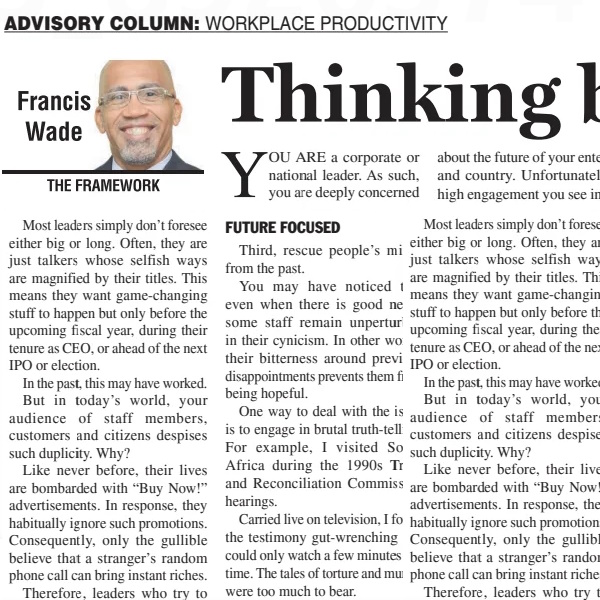Thinking Big and Going Long
As a corporate or national leader, you’re deeply concerned about the future of your enterprise or country. But you may notice something is missing—a sense of shared hope and engagement. You ask yourself, “Why?”
The last time many Jamaicans felt truly hopeful about the future was around 1962, just before independence. I wasn’t born then, but elders recall the power of that moment: a future brimming with promise.
Before independence, leaders like Marcus Garvey, Sam Sharpe, and Norman Manley courageously articulated a vision for Jamaica. They took these stands, despite knowing they wouldn’t see the outcomes in their lifetime, or even in the coming decades. We revere them because they made unselfish sacrifices for the greater good, even when the odds were against them.
Today, we long for leaders with similar clarity and conviction—those not swayed by greed, political gain, or self-interest. Instead, we’ve grown accustomed to pointing fingers; for many, leadership has become synonymous with corruption. Ironically, however, even flawed leaders can still “think big and go long.” They can look to our National Heroes as models. So, where can they start?
Understanding What Really Motivates People
Humans are creatures of imagination, and our motivation is deeply influenced by our vision of the future. This imagined future shapes our experience both now and in the long run.
Take, for example, the motivation of new employees. Initially, they’re excited. Over time, however, as they encounter challenges and setbacks, their enthusiasm fades. In environments that are merely transactional—where work is treated as nothing more than an exchange for money—this disillusionment runs deep.
Today’s younger employees, especially Gen Z, are making it clear: “That’s not enough.” They demand engagement that’s driven by purpose. To meet these expectations, leaders must do two things: think big and go long.
Thinking Big and Going Long
Most leaders don’t genuinely think big or long. They may talk about game-changing goals, but they only want results within the fiscal year, their CEO term, or before the next IPO or election. In the past, this approach might have worked.
But today, employees, customers, and citizens are quick to recognize shallow promises. In a world flooded with “Buy Now!” messages, people have learned to ignore hollow pitches and easy promises. Leaders who try to “sell” people on short-term impossibilities come across as self-serving, and the result is widespread contempt.
The essential truth? “Thinking big” requires “going long” at the same time. For example, Richard Williams developed a 25-year tennis plan for his daughters, Venus and Serena, long before they were born. GraceKennedy did something similar with its 2020 Vision.
Contrast this with the cautionary tales on the CompanyMan YouTube channel, where the creator explores the decline of companies like K-Mart and Nokia. Each story illustrates the dangers of short-term thinking—loss of market share, plummeting shareholder value, and mass layoffs.
These same mistakes happen on a national scale as well. Right now, around 30-40 national plans worldwide—like Vision 2030 Jamaica and the UN’s Sustainable Development Goals—are nearing their deadlines, and many are off track.
However, modern employees want more than just their leaders’ long-term thinking and big goals.
Freeing People from Past Disappointments
You may notice that even when there’s good news, some employees stay stuck in cynicism. Previous disappointments have hardened their outlook, making it difficult for them to feel optimistic.
One way to address this is through radical truth-telling. For example, I visited South Africa during the Truth and Reconciliation Commission hearings in the 1990s. The broadcasted testimonies were harrowing, recounting torture and murder. I could only watch in short bursts.
But the principle was powerful. Truth-telling can be liberating. In our case, the forward of Vision 2030 Jamaica, written 15 years ago, put it bluntly:
> “Partly due to our neglect of long-term issues, our nation has suffered from a number of inadequacies… Previous planning efforts floundered… Jamaicans have expressed a clear wish to break out of this vicious cycle of low performance and build a quality society.”
When organizations or nations engage in these difficult, honest conversations, they show that a troubled past doesn’t have to define the future. It allows employees and citizens alike to hope—and ultimately frees them to think big and go long once again.

